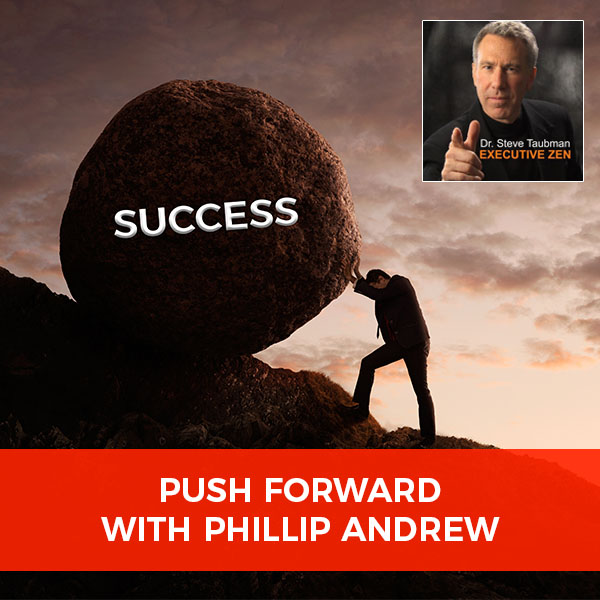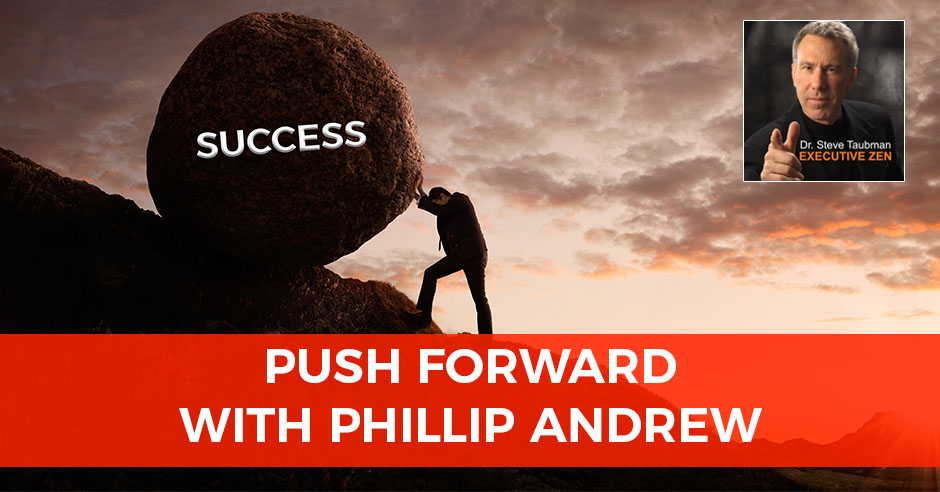

Phillip Andrew has worked with celebrities, Emmy nominated Executive Producers, Financial Advisors, Pastors, Former Inmates, On-Air TV + Radio personalities and other experts to develop their on-camera techniques and become more effective communicators both in front of and behind the camera. He teaches his clients how to marry their expertise and passion with their vulnerability and authenticity to create truly lasting results in their industries.
—
Listen to the podcast here:
Push Forward with Phillip Andrew
We’re talking about pushing through, although not in the way that you usually think of it. I’ve got a fascinating guest who will help me tease out the nuances of this question of pushing through, of resilience and perseverance, of breaking down our barriers and all those sorts of things and what that entails. Before we bring him on, I’ve been thinking about this question and we’ve talked about it in the past, in one form or another. It’s always a fascinating conversation for me because many of us have been led to believe that life and success are all about unrelenting effort and we take that approach. If you’re listening to the show, chances are you’re a leader or you want to be one. You’ve got a head full of should’s about what it means to push through. One of those is about how you’re supposed to be untiring, stubborn, unrelenting, and have your nose to the grindstone and your eye on the goal, being sure that’s one side of the success coin.
There’s another, and it often gets lost in the conventional success saga. You hear, “Winning isn’t everything. It’s the only thing. Failure isn’t an option. Never say die.” Let’s discuss that. First of all, raise your hand if you’ve ever read Think and Grow Rich or any other books that are about, how the way you think determines your reality. I absolutely believe that to be the case. Often, what we do is we program our minds and we condition our minds in such a way that we see a failure as a very negative thing, we see winning as the only thing.
We become depressed and despondent if we don’t get the results we want. It puts us in a position where it’s very difficult to enter into the next challenge because we’re carrying the patina of failure with us in everything we do. Looking back over my life and all the things I’ve done, the wake of failures, things I’ve done that didn’t pan out, things that didn’t get me the results I wanted. What do I do to release the weight of those things?
I’d like to converse with our guest about that because he has an insight and an understanding of the nuances of this and the wisdom of continuing to take good care of yourself so that process toward getting what you want isn’t being tainted by what you do to yourself when you don’t. As I look out over the world as a motivational speaker, as a keynote speaker, as a mindfulness coach, as a hypnotist, as a business performance coach, what I see is that we’re all wearing masks. We all have masks on that when you look at me, everything’s great, everything’s peachy keen. “How’s it going?” “Great, everything’s good. It couldn’t be better.” You meet people on the street and you see them they’re looking good. We’re all doing our best to look good, to wear our masks of success. Now that we’ve got social media, we have more places to go and express that greatness, that unflappability of our own, that “We’re tremendous.”
Failure isn't a dirty word. Click To TweetWe have no woes, we have no concerns, we don’t have difficulties in relationships, we’re great lovers, we’re making all the money we want to make, and life is peachy keen. That’s a mask. When you scratch the surface, all those people that you see out there, all your colleagues and all your superiors who looked good, the captain of the football team, the CEO of the company, that guy who’s wearing that stylish button-down shirt and khakis, holding a beer and looking like life is fantastic, the guy that you feel insecure around is probably secretly just as insecure as you are. We’re all secretly carrying the weight of our own failure.
We keep that mask on because of the abject terror of what’s underneath it. We secretly believe, “I’m inadequate and so I put on this mask of adequacy, of mastery, I’m fantastic.” It doesn’t get you what you want in life. It doesn’t get you to the final goal of outer and inner success, happiness, contentment, peace but it’s a close second. At least you look good, at least everybody thinks you’re happy, at least you’re able to intimidate others and maybe that intimidation will take you one step closer to your success.
Underneath the mask is this abject terror that what we are is the opposite of the mask. We are insecure failures. We don’t have what it takes and so we’ve got to work hard to look like we do. I’d like to pose a third option that you’re not your mask and you’re not the thing that your mask is there to mask either. Rather, there is a deeper level of who you are.
There is a fundamental source of contentment, peace, and mastery. The fear of removing the mask in order to expose your vulnerability is what keeps you stuck believing that you’re nothing more than the thing that your mask is there to hide. Where what I’ve discovered and what I continue to discover and rediscover because I’m not that smart and I’m not that consistent, that I will forget everything I’m telling you right now. I’ll go back to wearing the mask and secretly fearing that who I am is what I believe the mask is there to hide. I’ll forget that what’s underneath the thing that the mask is hiding is something deeper still, which is my own fundamental goodness, my innocence, my inner strength, and my creativity. There’s a way that we can all reach a place where we have access to that deeper part of ourselves. We’re not living with a mask and we’re not living raw as the thing that the mask is hiding, but that we access something much deeper. That’s where life gets interesting.

Push Forward: We don’t have to be winners every single second and we don’t have to be vulnerable about the fact that we’re vulnerable.
I took Woody for a walk before this radio program and on our walk, because I walked out the door thinking it was going to be a shorter walk than it was, I didn’t put on any shoes. I walked this entire walk barefoot. We walked about a mile back along the waterfront here in Burlington, Vermont, along the bike path, up through the grass, across through the condo complex and down the beautiful road. The entire time I was barefoot, I was thinking of the value, the importance of being barefoot sometimes. It’s like removing the mask and then removing the socks. It’s like grounding yourself with the earth, connecting with something fundamental like the earth. We all can benefit from becoming more grounded, taking the time and go barefoot every once in a while. Just strip off all the things that you think are unnecessary and connect with something that’s your source.
That’s the topic of a lot of our conversations. Those of you who are fans of mine are fans of mine because we’re getting down to the source. Executives Zen, what’s the Zen? What’s underneath all this stuff that you think is who you’re supposed to be and all the masks you wear to pretend you’re already that thing? We’ve all got a head full of “shoulds” about what you think it means to push through. We’re all believing that we need to be untiring and stubborn, that winning isn’t everything, it’s the only thing, and that there was another way. That’s what we’re here to talk about because failure isn’t a dirty word. We don’t have to be winners every single second and we don’t have to be vulnerable about the fact that we’re vulnerable.
I’ll be introducing you to a new friend who is doing some remarkable performance and leadership coaching, and what I’ve described as a more holistic way of business. If you’re stressed out, if you’re unhappy, if you’re confused that why your efforts have led you here, this discussion will open your eyes. I guarantee that there’s going to be some a-has and some ideas that are worth writing down.
—
I am thrilled to be introducing my guest. Phillip Andrew has made an impact in many ways on his television work, an Emmy-nominated producer. He’s been involved with shows like Undercover Boss and Mind Field, two interesting shows. As a media consultant, he has worked with celebrities, Emmy-nominated executive producers, financial advisors, pastors, former inmates, on-air TV and radio personalities, and other experts to develop their on-camera techniques and become more effective communicators both in front of and behind the camera. He teaches high performers how to thrive in their business and personal lives. He teaches how to marry their expertise and passion with their vulnerability and authenticity to create truly lasting results in their industries. I had the good fortune to meet him through our wonderful publicist and media manager, Jacquie Jordan of TVGuestpert.
When we spoke, I thought that I was dealing with a fresh mind and an unconventional thinker. He’s funny, he’s upbeat, he’s optimistic, he’s clear minded. This is going to be a nuanced approach to success. If you’re not up for some deep thinking, you may want to change stations. This isn’t the Knute Rockne you-can-do-it guy thing, but someone who understands people and knows how to help them understand themselves, what makes them tick? Although I titled it Pushing Through, it might also be more aptly titled, Why Are You Miserable?
Let’s pull off the facade mask and admit that accomplishment has not led to inner peace. See if we can find ways to redefine success so that it includes what you always hoped success would be at the end of the rainbow and have probably been pretending that it is, spiritual satisfaction, good relationships, passion, and inner calm. Having said all that, please welcome TV producer, media consultant and performance coach, Phillip Andrew. Welcome, Phillip. How are you doing?
Thank you so much for having me. It’s such a great opening. I appreciate it. I’m excited. I’m like, “I want to hear that. I want to hear this conversation. I’m ready for it.”
Try to constantly evolve with self-awareness and understanding yourself. Click To TweetI can hardly wait to hear what I have to say.
Even as you were doing your opening piece for the show, I’m thinking you’re hitting on all these things. We’re going to have a good conversation, but I always like to have a couple of notes just in case I want to hit certain things. It was so funny because you’re talking about so many things that I went down and there was a moment where my own insecurity jumps in and it’s like, “He’s saying all the things I want to say. Do I even have anything to offer? What am I going to talk about?” It’s like that little kid, that seventh grader, who rose his hand and he thought he knew the answer, got called on and got wrong and they made fun of him. That little kid still exists inside of me. I always have to remind myself not to be a people pleaser, not just try to say things, but to be of service to people. We could talk about this stuff, but the insecurity still lives within.
I lived that as well. I haven’t done a full demographic research project on our audience, but I have to assume that they’re more conscious than the average pair. As you and I both know, there are people out there who live at the upper echelons of the business world who are still wolves, it’s eat or be eaten. They sense and spot weakness and insecurity, and they think that it’s a negative trait. You and I may not be their cup of tea, but by the same token, they’re people who are ultimately doing well the real work in the world having compassion and appreciation for insecurity and vulnerability.
The reality is that everybody’s got what you described. I was talking with a guest, we had Kathrin O’Sullivan on here. Her background was Google. She was a Google executive. Google’s done a lot of work in the area of mindfulness, creating a mindful culture where they create a group of people who will sit down and you’ll get that critical mass of mindfulness practitioners to meditate together. She did the same thing. She said, “One of the things about mindfulness is you become aware of the different parts of yourself. As I’m talking, a part of me is glad I’m here talking. I’ve got a lot of cool things to say and I know I do. Part of me is feeling like, ‘I don’t know if anybody is going to appreciate me. I’m not good enough.’” She said, “Part of mindfulness is knowing that all those parts are there.”
It comes into having different degrees in trying to constantly evolve with self-awareness and understanding yourself. My understanding in that beginning of that for me was starting to look at these ideas of character defects. What are these things that I have that are natural to me, and that are getting in my way? In understanding that, those are going to be things that I may die with. I may die being very judgmental, self-centered, and pretty much entitled. It’s not that I have to look at those things and be a victim of those. It’s like, “I know what to look out for now.” I know when those things start creeping in, I understand how do I reset myself so that I’m not running around my world being entitled, being self-centered, being judgmental, and being self-righteous. Much of it stems from having the ability to look at yourself and say, “That’s what I’m dealing with. Not a big deal. Let’s move forward.”

Push Forward: Have the ability to really look at yourself and say, “That’s what I’m dealing with; not a big deal. Let’s move forward.”
I love what you’re saying because making this distinction since we started the show, I thought saying this is about pushing through, a lot of people are looking or expecting to hear about how to win at all costs. That’s often the conversation that happens in business. Yet what you’re talking about, there’s a certain freedom that comes from admitting your insecurities and admitting even the things that you may never overcome. I may be a judgmental jerk for the rest of my life but ultimately, there are only so many choices available to us. One choice is to accept our defects, admit them and be aware of them, and then change our relationship with them, which is what I hear you do. Another choice is pretending they’re not there and living our lives with the mask. You’ll say, “There’s nothing wrong with me.”
The third one is maybe you get lucky enough to have them disappear or maybe you were lucky enough to be born without them in the first place, but that’s for a tiny minority. For our audience, the people out there who are thinking, “These people are being very vulnerable and sharing their insecurities. I’m not that kind of person.” I’m going to invite you to consider a new paradigm, which is to start opening up to the fact that you are as defective as everybody else. If you start giving yourself some latitude, what comes with it is some freedom. You may never change the things that are not great about yourself, but you may change your relationship with them. You’re going to start to accept those defects. First of all, give us a little bit of your life story so we get a context for this. Then let’s talk about how you and other people might go from being at odds with your own defects to embracing them and using them to make you better at what you do.
I live in Los Angeles, which is funny because when you were talking about walking a mile barefoot, I don’t know if I could do that in Los Angeles. I don’t know if there’s a mile of safe ground for me to walk down there. I live in Los Angeles but I was born and raised in Metro Detroit. As a little kid, I was pretty stereotypical of everybody, I hung out with older kids, I had those thoughts of, “Am I smart enough? Am I funny enough? Am I cool enough?” All those little things that you feel growing up. I had that anxiety, I eventually got to a stage where later on in my high school days my mother got sick and passed away from cancer. I was already a kid dealing with the normal adolescence, not feeling secure and not knowing what was going on. You add the instance with my mother on there and I was just a lost kid.
I was overwhelmed by the emotions of life. I didn’t have any of the coping mechanisms to be able to process those emotions, those feelings and understand what was going on. Like a lot of young kids, especially kids in the Midwest, you start drinking. A big part of my story was I started abusing alcohol at a younger age, getting into a lot of problems. In hindsight, it was a lot of crying for help. It was a lot of “I’m in pain. I don’t know what’s going on. I don’t know how to deal with these emotions.” I was acting out in a lot of ways. That led to getting arrested, getting into some problems when I was eighteen, when I was nineteen, and when I was twenty. When I was 22 years old, I got ready to move out to Los Angeles. I got hit for a DUI and that luckily was almost the moment where something clicked and I realized, “There’s a problem here and I can’t keep doing this.”
I was lucky in that instance. I always say I’m so happy that my issues were with alcohol because it was so obvious that I was banging my head against the wall. I was drinking and driving, I was getting into fights, I was getting hospitalized, I was doing all these stupid things. It was obvious that something was wrong. Absolutely, it made me have to look at the issue at hand and start to work through things. I got into twelve-step programs. I started working these things and started developing some of the coping skills to step to identify what is going on inside of your brain, and how is it influencing you to behave and feel the way that you feel?
There's a lot of things that people lean on that are actually preventing them from getting the real help that they need. Click To TweetThat was one thing that I always had been huge, which is I’m all for therapy. Therapy is key. We all should be talking with people about our issues. There was something powerful about being in a group setting where you were hearing not only other people my age. The first time that I heard a 75-year-old guy talking about feelings and struggling with things that I struggled with as a 22-year-old man, it blew my mind. I always respected my elders but only enough to where I will push you down the stairs. I didn’t think that you have anything to offer me.
Once I started to realize “There are other people dealing with some of these same feelings, emotions, the same stuff I’m dealing with. It’s not all about me. What’s going on?” I got in like a sponge and started soaking things up. Vulnerability saved my life. I had so many secrets. It’s not my idea but I’ve heard many people say, “Secrets grow in the dark.” They become these massive monsters that terrify us, overwhelm us, and scare us to a point where it’s hard to ignore them. We think we push them into some deep, dark crevice of our brain, but they’re influencing us so much. When I started to learn how to share what I was feeling, how to share the crazy thoughts that were in my head that I thought only I had, and I started to release some of these secrets, it was freedom. You’ve touched on it. You set a perfect word to describe it. I experienced so much freedom through sharing these things that I used to have so much shame and guilt over. I like to believe that people know the real me, pretty much the deep down.
You’ve raised a few points. You started out talking about being a sensitive kid without coping mechanisms and turning to alcohol and eventually, getting that wakeup call with a DUI. You said something that struck me, you said that it’s good that it was alcohol because the effect was so obvious. A lot of people are walking around with addictions that aren’t as obvious. If you’re an alcoholic, it’s easy to find help. If your workaholic, not so much because people reward workaholism or if you’re a relationship-aholic.
Love addiction is insane, the co-dependency, needing of other people’s approval. There’s a lot of things that people lean on that are preventing them from getting the real help that they need whether it’s overeating or not eating enough. People always joke about the number of mental issues that plague people that are in fitness, which is crazy. We have social media that fuels this desire to have these bodies that people admire. Underneath it, you have a lot of anxiety, stresses and insecurities, and people that are trying to fill themselves with external love and support of other people instead of being able to fill themselves. It’s everywhere. I’m grateful that the state of Michigan thought it was a bad idea for me to continue to drink and drive.
Find out what you want and write it down. Have a mission. That mission will guide you when you're in rough waters. Click To TweetI started with the question of how. How do you come to be somebody who helps people in the way that you do? Through that story, the two things that were most valuable is the concept of the group, the idea that, “I’m coming clean. I’m admitting my failures.” Like in AA, you admit you’re powerless over your addiction.
A lot of people are stuck at the level before admission. They’re too busy hiding out and thinking that’s strength when in fact that’s the opposite of strength. Having the strength to come clean about, “My life isn’t working.” Then doing it among various kinds of people who can hear you and reflect it back and say, “You’re not crazy.” You said, “Vulnerability saved my life.” It reminded me of this line I heard years ago which said, “You’re only as sick as your secrets.” The more you’re hiding out in ambiguity, hiding out in this vague sense of who you think you are, the more pain you’re in, the more you’re suffering. In all likelihood, the less effective you are being, even though you’re working your butt off trying to be effective.
There’s an inherent part of us that we all want to be seen for who we are. We want to be understood for the person that we see when we look in the mirror. That’s the problem with the masks. You touched on it so perfectly as we put these masks on because we think at a young age somehow we thought it was protection. We thought that there was a moment we were told that we shouldn’t be so honest, that we shouldn’t say things a certain way. There’s a million and one ways to ruin a child’s brain. At times, we mean well with the things that we say to kids, but we forget that. If you’re a 50-year-old person with 50 years of life experience and you’re saying something, it’s easy to forget that you’re talking to a thirteen-year-old kid who isn’t processing things the same way and might not think of your message the same way.
At some stage of the game, we start to develop these masks, in that gap between who you feel that you are deep down, the core of you, your secrets, your vulnerabilities, all of that. The farther and farther that the person gets away from who you are showing up in the world as to other people, the more disconnected you feel from who you are and the more alone you can be. I have a friend who had a lot of deep secrets. He didn’t let anyone know until he was deep into his 30s. He described it as, “Even when I did well, even when I had success, even when I was doing well in school or I was dating the hottest girl in school or people were talking to me and they were commending me. People could tell me these things.”

Push Forward: The farther you get away from who you are showing up in the world as to other people, the more disconnected you feel from actually who you are and the more alone you can be.
In his head, they were saying that to the version of him he was allowing them to see and it wasn’t to him. He had this idea that no matter how many times you gave him a compliment, in his brain, he’s still sad. “If you only knew the person I was deep down, you wouldn’t say those things.” Talk about isolation. Talk about putting yourself into a box and feeling disconnected from everyone. We are creatures of connection. We want community. We’re not meant to be doing this thing alone.
I appreciate this so much because there are certain kinds of people in the world, artists, among them, performing artists and people in your world, they challenge conventional and common wisdom. We, like a great artist, will do things differently. Picasso came up with a new way. We, meaning people like you and me who are having these kinds of conversation, we’re challenging conventional motivational speakers who bring this very simplistic, one-sided message to the world about what it means to be successful. That ends up causing people to screw the mask on that much tighter because, “I’ve got to be like this high if I want to be successful.” The flip side of that is you don’t feel your life. I heard that in Postcards from the Edge. It’s like “I’ve got all this success, but I don’t feel my life. It feels like somebody else’s life. I’m not fulfilled.” You and I had a conversation the other day. Reflect back on it about how people experience a speaker like Gary Vaynerchuk.
I love Gary Vee. I’ve got a lot of different speakers that I follow and guys that I appreciate the work they do. I like Gary Vee but I also think that there are times where it also taps in. I don’t think they do it intentionally, but there are times where it can tap into this idea that you’ve got to rise and grind. Motivation is not an inspirational quote on your social media feed. There’s got to be more to it that’s fueling it. It can’t be like what you talked about, “Just do it. You got to rise and grind.” In all of these very simplistic things, those are good, but you have to understand what’s behind them.
You can’t just read one quote out of the book. You got to understand what the author was talking about, all of it. Not to get super religious or anything, but there’s a Bible quote that a lot of people use and it’s Philippians 4:13. It’s this quote of, “I can do all things through Christ who strengthens me.” People use it as a rallying cry like, “I can do all things.” The point of that whole verse, if you read it all, it’s about you’re good wherever you’re at. That’s the message. It isn’t to go out there and conquer the world and you can do all these things like “It’s the fourth quarter, let’s win the game.” You can be ambitious, you can want more, you can want to accomplish a lot, but also understand where you’re at right now at this moment, you’re good.
Love yourself for who you are. Be here now.
There’s a problem sometimes with the social media guys. While there’s a lot that helps people kickstart some of these thoughts, people often forget that a lot of people in this world that have not grown up with positive influences. They never grew up hearing these things. It is important for the Eric Thomas’, Gary Vee’s, Tony Robbins’ and these guys to be speaking these ways. At a certain point, it needs to go a little deeper than a halftime speak. It needs to be more. We need to be helping people learn a little bit more about themselves.
We all need to learn how to live our own lives and find the things that are important to us. Click To TweetWe don’t want to create these people who are amazing at living other people’s lives. We all need to learn how to live our own lives and find the things that are important to us. I’ll listen to them and we will figure out pretty quickly, you are amazing at living a different life than the one that you want. As soon as we can marry the two, as soon as we can get you living the life you want, you are going to find success. Until you are being authentic into what makes you tick and what you want, it’s going to be a hard road. I see it pop up a lot.
I want to have you explore this with me a little bit more. You said something about interrogating our reality. Can you talk about that?
I’m a cop’s kid. My dad’s a retired police chief from Metro Detroit. I love cops. I love crime shows. We love all the True Crime stuff. Turn yourself into an investigator. Be the good cop and the bad cop and put yourself in that hot seat. Turn all the lights off, get the one spotlight, put it on yourself and start asking yourself questions like, “What do you want?” It’s like these ideas of, “Everything that you know, do you know it?”
You start to ask these questions of yourself, “Why am I unhappy?” If you’re sitting to this and you’re reading this right now and you’re feeling, “I’m not fulfilled.” That’s a great starting point. Why are you not fulfilled? What is it about your job? Is it that you’re not making enough money? Then let’s go down that rabbit hole. Why do you need more money? Why do you need those things? It’s so often in our conversations with even other people, we’re always scratching the surface. We’re having these very superficial conversations and that includes ourselves. We don’t dive deep. It’s one important thing that we need to do is start to dive deep and figure out, “What do I believe? Why do I believe it? Is that true? Are these statements that I’m telling myself inside of my head true?”

Push Forward: One important thing that we need to do is to dive deep and figure out what we believe and why we believe in it.
I had a guy working with and he is 5’7” to 5’8”. In his eyes, taller women do not like short guys. “I’m short. That means no attractive taller woman will ever like me ever.” He told himself that and then that’s all. He accepted that. I was like, “No, let’s stop.” The fact that the statement you’ve said, “No tall women will ever like me because I’m short.” Is that true 100% of the time? “Of course, not.” Then it’s not true. Can we say that’s not a true statement? It’s so simple at times to say it that way, but there are so many things in our lives that we think are fact. “This is the way the world is. This is how I am. I’ve always been this way. I grew up like this. My mother’s like this, so I’m like this.” There are plenty of examples of people who grew up one way and did different, that they were able to change their lives for the betterment.
What we have to ask ourselves is whenever you find these statements, when you have these things that you feel are so real and they make so much sense, stop. Interrogate it and say, “Does this thought process, does this belief, this line of thinking serve me for me to become better or me to get what I want?” If the answer is not yes, we need to identify it. We need to start changing that thought process and find a new reality to believe in. It only starts when you start asking these questions and interrogating what you think that you know.
In the work that I do that’s partly in mindfulness because you’re training yourself to look at what is without telling a story about it. It’s also cognitive behavioral therapy, which is like “What are the beliefs underlying this paradigm that I’m living?” I love the idea of the interrogation, shining the light on yourself in a dark room. It’s a great model. People like myself who are analytical, skeptical and want to only do what’s truthful, the challenge to us sometimes is, “I can’t change my belief because this is a true belief. Just to say that this belief doesn’t serve me isn’t enough for me to change it. If it’s true, then it doesn’t matter if it serves me or not. My higher purpose is to serve the truth,” but is it the truth?
That’s the thing that’s interesting about this, for those skeptics out there. These things you think are true that limit your consciousness, are they the truth and is there a perspective or there is a place you could stand from which you can see that there are many truths and that there’s another one that might be more suited to you?
It’s setting up the belief systems that are going to serve us for the long haul for what we want. That’s another part of the interrogating. The reality is also like interrogating yourself and figuring out what is it that you want. The problem is when you’re not living intentionally, the world will start to pick things for you. The world continues to move, it continues to spin, and it will bring you different paths. If you’re not being intentional about where you want to go, most people are going to end up taking the path of least resistance. You’re going to end up in a job that made sense, you’re not loving it, but you didn’t think you’d be in it forever. Then all of a sudden, now we are in it for eight years, you’re in it ten years and you’re in it for fifteen.
Time continues to go on. If you're not making decisions towards a big mission, the world will just present things and you'll take it as is. Click To TweetTime continues to go on and if you’re not making decisions for yourself towards some greater, big mission that you have, then the world will present things and you’ll take it as is. It’s easy then to get in deep in your career and to be like, “This is not what I signed up for. This is not what I thought it was going be.” Understanding that the fulfillment isn’t there and a lot of it stems from not being intentional with what you wanted for your life to look like.
Ultimately, that leads to crisis management. You’re putting out fires, fixing one problem, fixing the next problem and doing the next thing without any overarching sense of purpose. I remember hearing that quote, “If you’re up to your waist in alligators, sometimes you forget that your purpose was to drain the swamp.” You’re busy fending off the alligators, you had a bigger idea which was, “I’m going to drain the swamp so there won’t be any alligators.” Let’s create a life that suits our ultimate goals rather than just dealing with whatever presents itself as you put it. Life keeps presenting itself to you in some way.
I started to build this mission for what I wanted. Life didn’t get harder. Life, in a way, got easier because I knew where I was heading. I had picked the destination and now I can start planning a vacation because I know where I want to go. I can get into the details and how am I going to do it. When we don’t have a mission or a plan or a place we’re heading, it’s so easy to get overwhelmed because there are so many unanswered questions. A lot of times it’s finding out what do you want, write it down, have a mission, and that that mission helps guide you when you’re in the rough waters. I love the quote, “Anyone can steer the ship when the water is calm.” When things get tough and then life is hitting you, you don’t know what’s going on, there’s an issue with the kids, with the relationship or at work, any of these things, you can silence it by saying, “What’s the big mission? What’s the big thing I wanted for my life?”

Push Forward: When things get tough and life is hitting you and you don’t know what’s going on, you can silence it by saying, “What’s the big mission, the big thing I want for my life?”
Now that I know that, “How do I handle myself at this moment so that I know I’m still heading towards my mission?” It has made decision making so much easier for me because I can look at things and I go, “If I’m not heading towards the mission, it’s probably not that big of a deal and I don’t need to worry about it. I don’t need to let it take energy from me. I can stay on the path, stay on the line, moving on the path towards the mission.”
That’s why sometimes I host this show and I end up thinking, “Am I hosting a show for others or is this therapy for me?” This is therapy for me. You’re saying a lot of things that I need to hear, that I need to be reminded of. I have the tendency to go off in a lot of different directions and follow my latest dream. Sometimes that will throw me off my purpose. It will make me less effective. It will make me more stressed out. For our audience, if that’s you, one of the takeaways here is that it’s worth going back and reflecting on what’s your big mission, your big vision. Are the things you’re doing supportive of that? Are you just being led around by the nose by the next distraction? Do you have ADOS syndrome?
To everybody reading this, you’re not alone. If you’re stressed, suffering, confused, overworking and overthinking things, I believe that there are tools and techniques and a way of thinking that isn’t always easy to access by yourself. With coaching, with supportive people and with the willingness to be vulnerable and honest, especially if you’re an executive and influencing other people, you have an obligation to be at your best self. That doesn’t mean wearing the mask and gritting your teeth, but rather being your best self as somebody who’s coming from a place of inner wisdom and inner peace. This conversation, hopefully, has pushed a few buttons for you in that way to think about where this could go for you? What’s next for you?
You have an obligation to be at your best self. Click To TweetIf you’ve enjoyed the show, please send your comments to SteveTaubman@gmail.com and feel free to suggest a topic. If you’d like to learn how to bring me to your company to create a mindful holistic organization of conscious leaders and fearless salespeople, contact me through SteveTaubman.com. We always end our shows with a metaphor, a quote, and a challenge. Phillip shared with me as I was telling him what a great show this has been for me, about how sometimes guests or hosts will post a quote and something he might’ve said. He’ll go and say, “I can’t believe I said that.”
I’ve been in that position, too. It all comes down to flow, being in the flow and what it could potentially be for you, the reader, to find yourself into that so you might end up saying some things that then go back and remind you about how to live the life you meant to live. We’re our own best teachers, but we need to be in the right state to teach ourselves. I play a game called disc golf or Frisbee golf. I never got into the conventional golf, but I love throwing that Frisbee at the basket. What happens when you played disc golf is that the basket you’re shooting for might be around a bend and down the fairway. It’s not a straight open fairway but it’s usually through the woods.
The metaphor is, “Don’t throw to the basket, throw it to the next obstacle.” Take that next step. Move ultimately in the direction of your dreams. Have a picture in your mind of what the goal looks like. Throw little ways and then reassess. Don’t make yourself crazy trying to know the entire path before you start on the path. Stay mindful, stay fluid, stay flexible and be willing to reassess. Interrogate your reality. Throw that disc. Get there where the disc landed and interrogate the reality like, “What do I need to do now?” That will make you far more effective in the long run than if you become one of those people who’s got dogged in determination to reach a goal and you’re never watching yourself on the process of getting there. That’s a powerful one.
Quote for the day, “We all have a better guide in ourselves if we would attend to it than any other person can be.” Jane Austen said that. Phillip, what do you have for us as a challenge for the day?
One thing I always talk with people is this idea of, we all would hope that the doctor is on the best on his game. We all want the chef to make sure that the chef is giving their 100% when they’re cooking our steak or quinoa if you’re vegan. Instead of pointing the finger at everyone else, ask yourself this moment, “What would my family look like?” “What would my friends’ circle look like?” “What would my organization look like?” or “What would the country look like?” You want to get big. What would my organization look like if everyone was given the same amount of effort I was giving? Look at that and play it out in that way of, if every single person in your department or in your company or in your sales team, if everyone was performing exactly how you did, how would that company now look?

Push Forward: Instead of pointing the finger at everyone else, ask yourself, “What would my family, my friends, or my organization look like if everyone gives the same amount of effort I was giving?”
How can people learn more about you or contact you?
You can always reach me. You can shoot me an email. I’d love to hear from you. That’s PhillipAndrewLA@gmail.com. I have a website, a blog, a podcast, all that good stuff, PhillipAndrew.co, and you can find me Phillip Andrew LA on all the social media platforms. If you’re listening to this and anything jumped out, or even if you want to yell at me and say I don’t know what I’m talking about, I always love those things. I always love to learn. I love the phrase, “It’s not win or lose, you either win or you learn.” If I made a mistake, if I said something you didn’t like, I’d love to hear from you and I’d love to learn more. I can’t wait to hear from you guys.
I appreciate you being here. Folks, share this with your friends, subscribe to my podcast. Visit Executive Zen on iTunes or find the replays on SteveTaubman.com/ExecutiveZen. In our next episode, we’ll be joined by motivational speaker, Dom Faussette. We’ll be talking about command presence, the military concept that will make you a better executive. Thank you for joining us on the show. Have a great week. Remember to lead consciously and profit responsibility.
Important Links:
- Think and Grow Rich
- Phillip Andrew
- SteveTaubman@gmail.com
- SteveTaubman.com
- PhillipAndrewLA@gmail.com
- PhillipAndrew.co
- iTunes
- SteveTaubman.com/ExecutiveZen
About Phillip Andrew

I am an Emmy-nominated TV Producer, a world-traveled DJ and MC, a media and life coach, an author, and speaker.
But none of that really matters.
What matters is I am dedicated to helping other people through the power of storytelling.
I am passionate about educating, entertaining, and connecting with people in a way that encourages, empowers, and provokes insight.
Like many children, I grew up feeling anxiety over insecurities and the uncertainties of life.
I didn’t know if I was cool enough, funny enough, or smart enough for anyone to like me.
That anxiety led me to abuse alcohol beginning in my pre-teens first getting drunk at the age of 11.
When I was 14, my mother was diagnosed with cancer, and during my Sophomore year of High School, exactly 1 week before my 16th birthday, she passed away.
That was the fuel being poured on an already burning fire.
During my speeches, I talk with students about my adventures traveling the world, dealing with the death of a parent, overcoming addiction, and how learning to take ownership over my life and use my hardships as a catalyst for positive change helped create a life I am proud of today.
I would love to come and talk with your school, group, or organization about how to develop resilience, stand in life with integrity, learn to develop strong friendships and community, and how to have a fun and fulfilling life all at the same time.
I cannot wait to talk with you about your upcoming event and how I can be of service to you and your community.